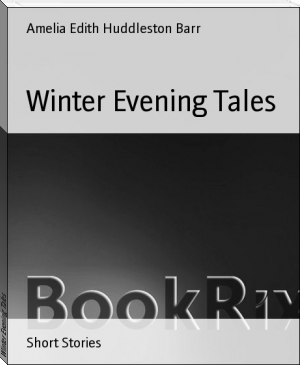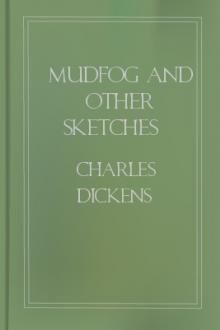Scottish Sketches, Amelia Edith Huddleston Barr [primary phonics .txt] 📗

- Author: Amelia Edith Huddleston Barr
Book online «Scottish Sketches, Amelia Edith Huddleston Barr [primary phonics .txt] 📗». Author Amelia Edith Huddleston Barr
Robert Leslie has done well in America, and no man is a more warm and earnest advocate of "the faith once delivered to the saints." I read a little speech of his some time ago at the dedication of a church, and it greatly pleased me.
"Many things," he said, "have doubtless been improved in this age, for man's works are progressive and require improvement; but who," he asked, "can improve the sunshine and the flowers, the wheat and the corn? And who will give us anything worthy to take the place of the religion of our fathers and mothers? And what teachers have come comparable to Christ, to David, Isaiah, and Paul?"
Jenny only died a year ago. She brought up David's children admirably, and saw, to her great delight, the marriage of Flora and young Captain Callendar. For it had long been her wish to go back to Argyleshire "among her ain folk and die among the mountains," and this marriage satisfied all her longings. One evening they found her sitting in her open door with her face turned towards the cloud-cleaving hills. Her knitting had fallen upon her lap, her earthly work was done for ever, and she had put on the garments of the eternal Sabbath. But there was a wonderful smile on her simple, kindly face. Soul and body had parted with a smile. Oh, how happy are those whom the Master finds waiting for him, and who, when he calls, pass gently away!
"Up to the golden citadel they fare,
And as they go their limbs grow full of might;
And One awaits them at the topmost stair,
One whom they had not seen, but knew at sight."
ANDREW CARGILL'S CONFESSION.
CHAPTER I.
Between Sinverness and Creffel lies the valley of Glenmora. Sca Fells and Soutra Fells guard it on each hand, and the long, treacherous sweep of Solway Frith is its outlet. It is a region of hills and moors, inhabited by a people of singular gravity and simplicity of character, a pastoral people, who in its solemn high places have learned how to interpret the voices of winds and watersand to devoutly love their God.
Most of them are of the purest Saxon origin; but here and there one meets the massive features and the blue bonnet of the Lowland Scots, descendants of those stern Covenanters who from the coasts of Galloway and Dumfries sought refuge in the strength of these lonely hills. They are easily distinguished, and are very proud of their descent from this race whom
"God anointed with his odorous oil
To wrestle, not to reign."
Thirty years ago their leader and elder was Andrew Cargill, a man of the same lineage as that famous Donald Cargill who was the Boanerges of the Covenant, and who suffered martyrdom for his faith at the town of Queensferry. Andrew never forgot this fact, and the stern, just, uncompromising spirit of the old Protester still lived in him. He was a man well-to-do in the world, and his comfortable stone house was one of the best known in the vale of Glenmora.
People who live amid grand scenery are not generally sensitive to it, but Andrew was. The adoring spirit in which he stood one autumn evening at his own door was a very common mood with him. He looked over the moors carpeted with golden brown, and the hills covered with sheep and cattle, at the towering crags, more like clouds at sunset than things of solid land, at the children among the heather picking bilberries, at the deep, clear, purple mist that filled the valley, not hindering the view, but giving everything a strangely solemn aspect, and his face relaxed into something very like a smile as he said, "It is the wark o' my Father's hand, and praised be his name."
He stood at his own open door looking at these things, and inside his wife Mysie was laying the supper-board with haver bread and cheese and milk. A bright fire blazed on the wide hearth, and half a dozen sheep-dogs spread out their white breasts to the heat. Great settles of carved oak, bedded deep with fleeces of long wool, were on the sides of the fireplace, and from every wall racks of spotless deal, filled with crockery and pewter, reflected the shifting blaze.
Suddenly he stepped out and looked anxiously towards the horizon on all sides. "Mysie, woman," said he, "there is a storm coming up from old Solway; I maun e'en gae and fauld the ewes wi' their young lammies. Come awa', Keeper and Sandy."
The dogs selected rose at once and followed Andrew with right good-will. Mysie watched them a moment; but the great clouds of mist rolling down from the mountains soon hid the stalwart figure in its bonnet and plaid from view, and gave to the dogs' fitful barks a distant, muffled sound. So she went in and sat down upon the settle, folding her hands listlessly on her lap, and letting the smile fall from her face as a mask might fall. Oh, what a sad face it was then!
She sat thus in a very trance of sorrow until the tears dropped heavily and slowly down, and her lips began to move in broken supplications. Evidently these brought her the comfort she sought, for erelong she rose, saying softly to herself, "The lost bit o' siller was found, and the strayed sheep was come up wi', and the prodigal won hame again, and dootless, dootless, my ain dear lad will no be lost sight o'."
By this time the storm had broken, but Mysie was not uneasy. Andrew knew the hills like his own ingle, and she could tell to within five minutes how long it would take him to go to the fauld and back. But when it was ten minutes past his time Mysie stood anxiously in the open door and listened. Her ears, trained to almost supernatural quickness, soon detected above the winds and rain a sound of footsteps. She called a wise old sheep-dog and bid him listen. The creature held his head a moment to the ground, looked at her affirmatively, and at her command went to seek his master.
In a few moments she heard Andrew's peculiar "hallo!" and the joyful barking of the dog, and knew that all was right. Yet she could not go in; she felt that something unusual had happened, and stood waiting for whatever was coming. It was a poor, little, half-drowned baby. Andrew took it from under his plaid, and laid it in her arms, saying,
"I maun go now and look after the mither. I'll need to yoke the cart for her; she's past walking, and I'm sair feared she's past living; but you'll save the bit bairn, Mysie, nae doot; for God disna smite aften wi' baith hands."
"Where is she, Andrew?"
"'Mang the Druids' stanes, Mysie, and that's an ill place for a Christian woman to die. God forbid it!" he muttered, as he lit a lantern and went rapidly to the stable; "an evil place! under the vera altar-stane o' Satan. God stay the parting soul till it can hear a word o' his great mercy!"
With such a motive to prompt him, Andrew was not long in reaching the ruins of the old Druidical temple. Under a raised flat stone, which made a kind of shelter, a woman was lying. She was now insensible, and Andrew lifted her carefully into the cart. Perhaps it was some satisfaction to him that she did not actually die within such unhallowed precincts; but the poor creature herself was beyond such care. When she had seen her child in Mysie's arms, and comprehended Mysie's assurance that she would care for it, all anxiety slipped away from her. Andrew strove hard to make her understand the awful situation in which she was; but the girl lay smiling, with upturned eyes, as if she was glad to be relieved of the burden of living.
"You hae done your duty, gudeman," at length said Mysie, "and now you may leave the puir bit lassie to me; I'll dootless find a word o' comfort to say to her."
"But I'm feared, I am awfu' feared, woman, that she is but a prodigal and an--"
"Hush, gudeman! There is mercy for the prodigal daughter as weel as for the prodigal son;" and at these words Andrew went out with a dark, stern face, while she turned with a new and stronger tenderness to the dying woman.
"God is love," she whispered; "if you hae done aught wrang, there's the open grave o' Jesus, dearie; just bury your wrang-doing there." She was answered with a happy smile. "And your little lad is my lad fra this hour, dearie!" The dying lips parted, and Mysie knew they had spoken a blessing for her.
Nothing was found upon the woman that could identify her, nothing except a cruel letter, which evidently came from the girl's father; but even in this there was neither date nor locality named. It had no term of endearment to commence with, and was signed simply, "John Dunbar." Two things were, however, proven by it: that the woman's given name was Bessie, and that by her marriage she had cut herself off from her home and her father's affection.
So she was laid by stranger hands within that doorless house in the which God sometimes mercifully puts his weary ones to sleep. Mysie took the child to her heart at once, and Andrew was not long able to resist the little lad's beauty and winning ways. The neighbors began to call him "wee Andrew;" and the old man grew to love his namesake with a strangely tender affection.
Sometimes there was indeed a bitter feeling in Mysie's heart, as she saw how gentle he was with this child and remembered how stern and strict he had been with their own lad. She did not understand that the one was in reality the result of the other, the acknowledgement of his fault, and the touching effort to atone, in some way, for it.
One night, when wee Andrew was about seven years old, this wrong struck her in a manner peculiarly painful. Andrew had made a most extraordinary journey, even as far as Penrith. A large manufactory had been begun there, and a sudden demand for his long staple of white wool had sprung up. Moreover, he had had a prosperous journey, and brought back with him two books for the boy, AEsop's Fables and Robinson Crusoe.
When Mysie saw them, her heart swelled beyond control. She remembered a day when her own son Davie had begged for these very books and been refused with hard rebukes. She remembered the old man's bitter words and the child's bitter tears; but she did not reflect that the present concession was the result of the former refusal, nor yet that the books were much easier got and the money more plentiful than thirty years previous. When wee Andrew ran away with his treasures to the Druids' stones, Mysie went into the shippen, and did her milking to some very sad thoughts.
She was poisoning her heart with her own tears. When she returned to the "houseplace" and saw the child bending with rapt, earnest face over the books, she could not avoid murmuring that the son of a





Comments (0)